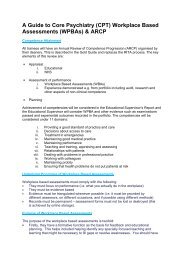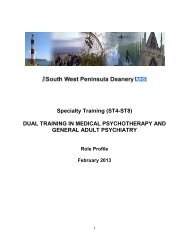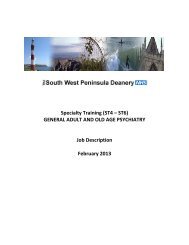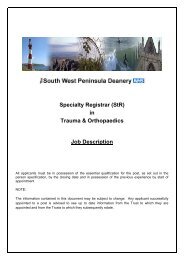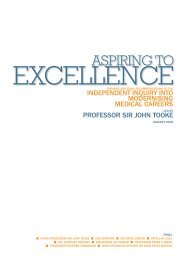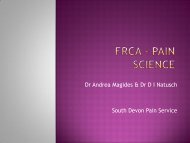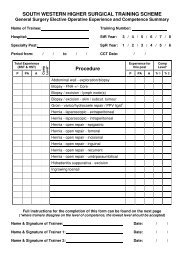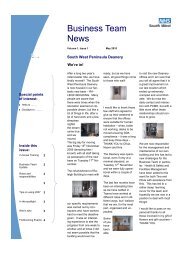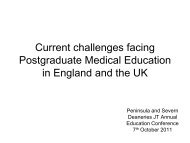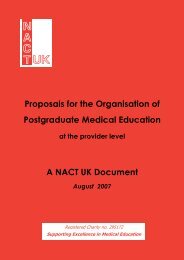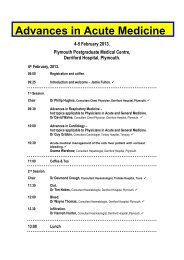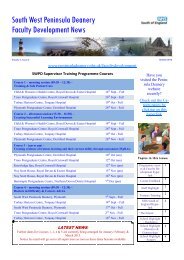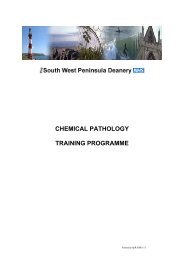Emergency Medicine Specialty Overview - South West Peninsula ...
Emergency Medicine Specialty Overview - South West Peninsula ...
Emergency Medicine Specialty Overview - South West Peninsula ...
You also want an ePaper? Increase the reach of your titles
YUMPU automatically turns print PDFs into web optimized ePapers that Google loves.
<strong>South</strong> <strong>West</strong> <strong>Peninsula</strong> Deanery<br />
Career Planning Service<br />
<strong>Emergency</strong> <strong>Medicine</strong> – <strong>South</strong> <strong>West</strong> <strong>Peninsula</strong> <strong>Overview</strong><br />
Dr Daranee Boon, A & E Consultant<br />
Information sheet organised by: Michael Tomlin PCMD Year 2<br />
Job Description<br />
• ‘Shop floor’ - clinical and management.<br />
• On-call commitments. More departments may develop 24/7 cover with the planned<br />
increase in consultant numbers.<br />
• Ward rounds<br />
• Clinics<br />
• Medical student teaching<br />
• Junior/senior doctor, practitioner teaching and training<br />
• Instruct on life support courses<br />
• Management – care pathways, process changes, links with other specialities<br />
• Work involving areas of specialist interest<br />
• Academic<br />
• College related work<br />
• Research<br />
Keys Skills and Personal Attributes<br />
• Team working is essential; therefore you need to be a team player and good<br />
communicator.<br />
• Need to be able to liaise with all specialities in the Trust, Pre-hospital and Primary<br />
Care.<br />
• High turnover of patients from all specialities and all age groups. Therefore you need<br />
to be a decision maker, be able to multi-task, and expect the unexpected.<br />
• Need to enjoy undertaking practical procedures; many are done in the working day.<br />
• Enjoy teaching as there is a high teaching load.<br />
• Good management skills are required.<br />
Routes into <strong>Emergency</strong> <strong>Medicine</strong><br />
F1 > F2 > ACCS (Acute Care Common Stem) for 2 years – CT1 (Core Training) and CT2,<br />
followed by 1 year at CT3, then HST (Higher Specialist Training) ST4-ST6.<br />
<strong>Overview</strong> of Training Required<br />
• Can enter by applying for ACCS CT1 and CT2 (run through of two years) or for three<br />
years CT1-CT3.<br />
• Undertake MCEM (Membership Examination of the College of <strong>Emergency</strong> <strong>Medicine</strong>)<br />
parts A, B, C during ACCS training.<br />
• CT3 year is 6 months of paediatrics and 6 months musculoskeletal.<br />
• As training is uncoupled, i.e. separate from HST, need to apply for HST posts (ST4-<br />
ST6) with FCEM (Fellowship Examination of the College of <strong>Emergency</strong> <strong>Medicine</strong>) as<br />
exit exam.<br />
• Note that the curriculum and training programme are still evolving and the information<br />
above may be incorrect, therefore keep an eye on the College of <strong>Emergency</strong><br />
<strong>Medicine</strong> website (see below).<br />
I:\Careers Planning\Careers Information\A-Z Careers Information Sheets\<strong>Emergency</strong><br />
<strong>Medicine</strong>\<strong>Emergency</strong><strong>Medicine</strong>_<strong>Overview</strong>_ Sept09.docx Page 1
Make sure you keep up to date with the changes being made to specialty training:<br />
www.mmc.nhs.uk & www.pmetb.org.uk<br />
Local Competition Data<br />
Competition is tough at ACCS, but at present more jobs than candidates at ST4 level.<br />
It is very likely that in the next few years the only way in to HST will be via ACCS/CT3 route.<br />
At present can apply for HST if you have evidence that you have achieved the appropriate<br />
competencies.<br />
Hints and Tips for Developing a Successful Career<br />
• Enjoy, and have a passion for your career and you won’t go far wrong.<br />
• Get as much experience as you can in <strong>Emergency</strong> <strong>Medicine</strong> and all related<br />
specialities.<br />
• Maintain healthy work/life balance.<br />
• Develop a special interest.<br />
Related Specialties<br />
Anaesthetics, Intensive Care <strong>Medicine</strong>, Pre-hospital, Paediatrics, Military, Acute <strong>Medicine</strong>,<br />
Remote Healthcare<br />
Directory of Email Contacts<br />
Name: David Alao - Derriford<br />
Email: david.alao2@phnt.swest.nhs.uk<br />
Phone: 01752 792488<br />
Katharine Robinson - Torbay<br />
Email: Katharine.robinson@nhs.net<br />
Phone: 01803 654069<br />
Peter Riou – Royal Devon & Exeter<br />
Email: peter.riou@rdeft.nhs.uk<br />
Phone: 01392 402305<br />
Tina Dahn (Speciality Manager)<br />
<strong>Peninsula</strong> Deanery, <strong>Peninsula</strong> Medical School<br />
Email: tina.dahn@peninsuladeanery.ac.uk<br />
Phone: 01752 431003<br />
Useful Web Addresses<br />
• NHS Careers http://www.nhscareers.nhs.uk go to Explore by career and scroll down<br />
to see options.<br />
• College of <strong>Emergency</strong> <strong>Medicine</strong> http://www.collemergencymed.ac.uk/default.asp<br />
• The Acute Care Common Stem Training Website http://www.accsuk.org.uk/<br />
I:\Careers Planning\Careers Information\A-Z Careers Information Sheets\<strong>Emergency</strong><br />
<strong>Medicine</strong>\<strong>Emergency</strong><strong>Medicine</strong>_<strong>Overview</strong>_ Sept09.docx Page 2



